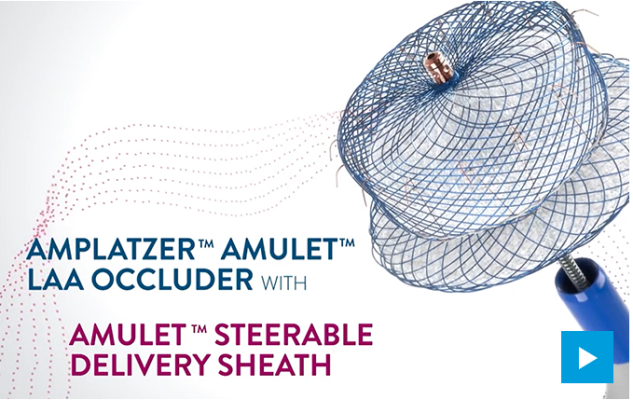
Nov. 18, 2024 — Abbott recently announced new data for the Amplatzer Amulet Left Atrial Appendage (LAA) Occluder to treat people with atrial fibrillation (AFib) who are at an increased risk of stroke. The new five-year findings demonstrate that Abbott's Amplatzer Amulet helps more patients avoid long-term use of blood-thinning medication compared to the Watchman device.
The findings provide physicians with valuable insights into the long-term benefits of the Amplatzer Amulet for patients at risk of stroke due to AFib. Key factors, such as long-lasting outcomes, effective LAA closure and a reduced need for blood-thinning medication, are critical considerations when choosing an LAA closure approach.
The results were presented at the American Heart Association's Scientific Sessions 2024 in Chicago (Nov. 16-18, 2024). These data were simultaneously published in the Journal of the American College of Cardiology.
Key Findings
Consisting of more than 1,800 patients, the Amulet IDE trial is the largest, randomized LAA occlusion study to date comparing the Abbott Amplatzer Amulet LAA Occluder head-to-head with Boston Scientific's Watchman device. Five-year findings from the prospective, global clinical trial demonstrated:
- A statistically significant higher percentage of Amplatzer Amulet patients were not using blood-thinner medication compared to Watchman patients (94.0% vs. 90.9%).
- A statistically significant lower number of fatal or disabling strokes with Amulet (22 vs. 39).
- Statistically significant data showing superior closure of the LAA being achieved with Amulet compared to Watchman (89.2% vs. 83.3%).
"Because blood thinners may cause excessive bleeding and side effects like nausea or dizziness, we as physicians want to avoid these medications for our patients following an LAA closure procedure," said Dhanunjaya Lakkireddy, M.D., Kansas City Heart Rhythm Institute at HCA Midwest Health, who served as principal investigator for the Amulet IDE trial. "With the five-year findings from Abbott's Amulet IDE study, doctors can even more confidently offer AFib patients the minimally invasive Amulet device that not only closes the LAA and reduces their risk of stroke, but can also keep them off blood-thinning medication long-term."
Superior LAA Closure & Stroke Risk Reduction
For patients with AFib who are unable to take blood-thinning medication long term, physicians may opt for occlusion (or closure) of the LAA through a minimally invasive procedure using devices like Abbott's Amplatzer Amulet to seal off the LAA entirely and reduce the risk of stroke.
Long-term medication to reduce the risk of stroke is not a viable option for many patients due to side-effects such as bleeding. The Amulet device offers a new solution for these individuals, featuring a dual-seal design that can effectively treat nearly all LAA structures and achieve permanent closure.
"For years, doctors and their patients only had one minimally invasive option to close the LAA," said Sandra Lesenfants, senior vice president of Abbott's structural heart business. "The Amplatzer Amulet redefined LAA closure by offering dual-seal technology that completely and immediately seals the LAA without requiring blood-thinning medication following the procedure. These data reinforce that the Amulet device is safe and effective, and also, importantly, that it's helping people enjoy their lives and worry less about the risk of having a stroke."
The Amplatzer Amulet LAA Occluder has been approved for use in more than 80 countries, including in Europe, the United States, Canada and Australia, since its initial CE Mark approval in 2013 and FDA approval in 2021.
For U.S. important safety information on the Amplatzer Amulet LAA Occluder, visit https://abbo.tt/AmuletISI.


 December 19, 2025
December 19, 2025 









